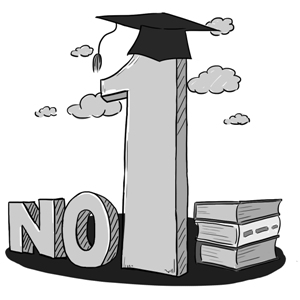
Illustration: Chen Xia/GT
Shanghai made headlines around the world this week after the city's students ranked first in mathematics, reading and science in standardized international tests assessing the educational attainment of 15-year-old students from 65 countries and regions.
The Programme for International Student Assessment (PISA) is conducted and organized by the Organisation for Economic Co-operation and Development every three years.
The latest assessment was conducted in April 2012 and the results were announced on Tuesday. This is the second time that Shanghai students have represented China to sit the test; other countries do not limit participants to one particular city. And on both occasions, Shanghai students topped the test in math, reading and science. This should perhaps be no surprise given that Shanghai students almost certainly also top the list for amount of time spent on homework and extracurricular classes.
Responses to the results have varied. My Australian friend sent me a link to a Daily Mail story. The British tabloid expressed its concern over the middling grade of British students with the headline: "Must do better! Poor marks for UK teens: Pupils STILL lag behind world rivals in maths and reading."
My US colleague joked that Shanghai parents' spending on tutors and summer camps has paid off.
A British editor noted that once again Chinese students proved to be good at taking tests.
Shanghai authorities expressed that while they were proud the city's students performed well in the test, they believe there are still many problems with the education system that await solutions. In a press conference, an educator from Shanghai's PISA branch said that Shanghai must take into consideration the huge amount of time students spend studying, and added that learning how to learn is more important than what has been learnt.
As a mother of a teenager, I see the PISA results as good news for Shanghai families. Of course, Shanghai can't represent the whole nation as students here enjoy much better resources than their peers in most other Chinese provinces and cities, especially those in remote areas. But Shanghai has always seen international metropolises as rivals in the fields of economics, culture, infrastructure and also education.
My husband and I do have concerns about the educational environment here. We were born in small villages in the 1970s and grew up without extra tutoring or cramming classes, but we managed to be admitted to top universities in big cities. We wish that our daughter could follow our path, but this wouldn't be realistic. She was born in Shanghai in 2001, where prevailing wisdom says, "Don't lose at the starting point." We all know that life is like a marathon; the start may well be insignificant when we look back from the finishing point. We are also aware that high marks don't necessarily signify real ability or translate to success in one's life and career.
In fact, I used to be very cynical about the education system in China. I didn't think teaching methods that focused on cramming for exams could produce real talent. My family considered plans to emigrate. But when I looked at my daughter's textbooks, I changed my mind. I found that her English books are very practical and contain plenty of useful content relevant to daily life. They are not filled with boring grammar drills or outdated vocabulary but are modern and pragmatic instead.
A Chinese university classmate of mine has lived in Canada for several years. She told me that after studying the education system there, she has concluded the differences between the two systems are like choosing between the options "sweet first, bitter later" and "bitter first, sweet later." In her opinion, if her daughter continues enjoying the less rigorous education environment in Canada, then her senior high school and university life will be terrible. She is planning to send her back to Shanghai for junior high school next year, which she claims will guarantee her daughter an easy time at college in any country.
It sounds complicated. But I agree with her to some extent. Let's go back to the PISA results. The standardized test, an internationally recognized testing method, focused not only on knowledge but also the ability to apply knowledge. We can say that practice makes perfect, and a heavy academic workload inspires and guides students to grasp skills or break deadlocks.
Ultimately, it should be recognized that the PISA results indicate that Shanghai is successful as far as education is concerned. Other places in China should learn from its success and not lag too far behind.
At the same time, we have to admit that not every student can survive the competition. High academic scores don't mean everything. Some people test well but struggle to succeed in jobs. There are many examples of school dropouts who became millionaires.
Keeping an open mind toward education is more important. Parents should assess our kids in a complete way and help them find their individual interests and strengths to plan for their futures.
The author is the managing editor of Global Times Metro Shanghai. fengyu@globaltimes.com.cn

